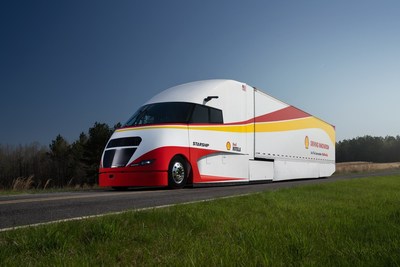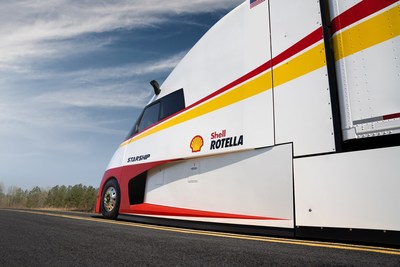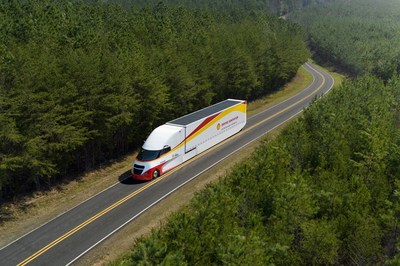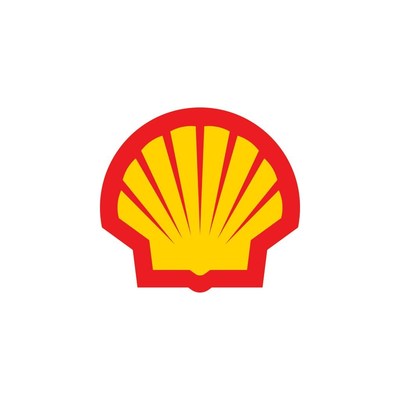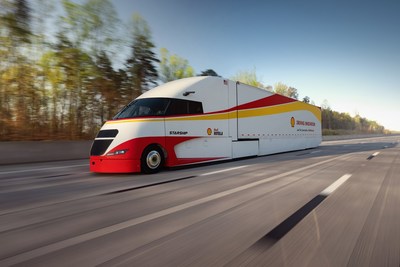|
01.09.2021 21:45:00
|
Shell Starship 2.0 performance demonstrates a reduction in carbon emissions by using efficient technologies
HOUSTON, Sept. 1, 2021 /PRNewswire/ -- The Shell Starship program exceeded its 2018 results in its second cross-country run using energy-efficient technologies to demonstrate what could be achieved driving a Class 8 truck in real-world conditions. The truck was designed to draw together these technologies in a single vehicle crafted to optimize performance and efficiency.
Following the initial program in 2018, the Shell Lubricants Solutions and Shell Technology teams worked together to pair the learnings from the first run with recent advancements in technology to develop the Shell Starship 2.0 truck. The new truck features a new chassis and drivetrain, along with new safety and fuel-efficient upgrades while maintaining the bespoke body from the original truck.
Shell Starship 2.0 made a cross-country drive across the U.S. from San Diego to Jacksonville, following the same route as in 2018. A second, shorter 400-mile evaluation run was conducted to provide additional data about its freight ton efficiency and fuel economy benefits. Both trips were monitored and verified by the North American Council for Freight Efficiency.
For the cross-country drive, Shell Starship 2.0 achieved 254 ton-miles per gallon1 for freight ton efficiency – a 3.5 times improvement over the North America average freight ton efficiency2 for trucks which is 72 ton-miles per gallon.3 Freight ton efficiency is the most relevant statistic for judging the energy intensity associated with moving cargo from point A to point B since it combines the weight of cargo being moved with the amount of fuel consumed. Shell Starship 2.0 achieved an impressive 10.8 MPG on its cross-country run as compared to the 8.94 achieved by Starship 1.0 and the 6.4 MPG North American fleet average MPG. These numbers are made even more significant given Shell Starship 2.0 beat the 178 ton-miles per gallon for freight ton efficiency achieved in 2018 while carrying an 18% increase in payload, from 39,900 pounds of clean reef material in 2018 to 47,100-pounds this year.
"With increasing efforts to decarbonize road freight, we saw an opportunity to further demonstrate that the use of today's efficient technologies can offer significant benefits to fleets," said Jeff Priborsky, Global Marketing Manager for the On-Highway Fleet Sector, Shell Lubricant Solutions. "Understanding that not all fleets run fully loaded from coast-to-coast we felt it was important to conduct a variety of tests to provide additional data that can show how trucking efficiencies work in different conditions, in order to provide tangible benefits to the freight transport industry."
The 400-mile short haul evaluation was completed in North Carolina with a cargo weight of 17.5 tons which was chosen to reflect more typical payload, commonly used by many fleets. The average fuel economy obtained was 12.0 mpg and the freight ton efficiency value was 210 ton-miles per U.S. gallon.4 While both values are direct consequences of the reduction in cargo mass, these are significant numbers when compared to the U.S. average of 6.4 mpg and 72 ton-miles per gallon. The fuel mileage is almost double the U.S. average and the ton-miles is more than triple.
"The efficiency testing with different payloads and miles driven demonstrate that efficient technologies have significant benefits for long-haul and shorter regional-haul applications," said Robert Mainwaring, Technology Manager for Innovation, Shell Lubricants. "Fleets and owner-operators can evaluate which technologies are most beneficial for them and pursue them today to find significant fuel savings and carbon emissions reductions."
The path to a low-carbon energy future will require a range of solutions and Shell Starship 2.0 demonstrates what is possible using efficient technologies and lubricants available today.
Notes to editors
- One of the most important metrics achieved by Shell Starship 2.0 is the potential reduction in CO2 emissions for the fleet industry. If every truck in North America could be as efficient as the Shell Starship 2.0, this could mean a potential reduction in CO2 emissions for North America of 275 million tons annually.
- Shell Starship 2.0 engine operated on Shell Rotella® T6 Ultra 5W-30 Full Synthetic engine oil which features a high temperature high shear (HTHS) viscosity formulation for reduced fuel consumption. This oil reduces internal engine friction while providing superior protection required to meet the American Petroleum Institute FA-4 performance standards. Other Shell Lubricants products helped power the efficiency drives including greases, transmission fluid and coolant.
- Join the conversation with #ShellStarship on social media and follow Shell Rotella on Facebook, Twitter and Instagram.
Cautionary note
The companies in which Royal Dutch Shell plc directly and indirectly owns investments are separate legal entities. In this press release "Shell", "Shell Group" and "Group" are sometimes used for convenience where references are made to Royal Dutch Shell plc and its subsidiaries in general. Likewise, the words "we", "us" and "our" are also used to refer to Royal Dutch Shell plc and its subsidiaries in general or to those who work for them. These terms are also used where no useful purpose is served by identifying the particular entity or entities. ''Subsidiaries'', "Shell subsidiaries" and "Shell companies" as used in this press release refer to entities over which Royal Dutch Shell plc either directly or indirectly has control. Entities and unincorporated arrangements over which Shell has joint control are generally referred to as "joint ventures" and "joint operations", respectively. Entities over which Shell has significant influence but neither control nor joint control are referred to as "associates". The term "Shell interest" is used for convenience to indicate the direct and/or indirect ownership interest held by Shell in an entity or unincorporated joint arrangement, after exclusion of all third-party interest.
This press release contains forward-looking statements (within the meaning of the U.S. Private Securities Litigation Reform Act of 1995) concerning the financial condition, results of operations and businesses of Royal Dutch Shell. All statements other than statements of historical fact are, or may be deemed to be, forward-looking statements. Forward-looking statements are statements of future expectations that are based on management's current expectations and assumptions and involve known and unknown risks and uncertainties that could cause actual results, performance or events to differ materially from those expressed or implied in these statements. Forward-looking statements include, among other things, statements concerning the potential exposure of Royal Dutch Shell to market risks and statements expressing management's expectations, beliefs, estimates, forecasts, projections and assumptions. These forward-looking statements are identified by their use of terms and phrases such as "aim", "ambition", ''anticipate'', ''believe'', ''could'', ''estimate'', ''expect'', ''goals'', ''intend'', ''may'', ''objectives'', ''outlook'', ''plan'', ''probably'', ''project'', ''risks'', "schedule", ''seek'', ''should'', ''target'', ''will'' and similar terms and phrases. There are a number of factors that could affect the future operations of Royal Dutch Shell and could cause those results to differ materially from those expressed in the forward-looking statements included in this [report], including (without limitation): (a) price fluctuations in crude oil and natural gas; (b) changes in demand for Shell's products; (c) currency fluctuations; (d) drilling and production results; (e) reserves estimates; (f) loss of market share and industry competition; (g) environmental and physical risks; (h) risks associated with the identification of suitable potential acquisition properties and targets, and successful negotiation and completion of such transactions; (i) the risk of doing business in developing countries and countries subject to international sanctions; (j) legislative, fiscal and regulatory developments including regulatory measures addressing climate change; (k) economic and financial market conditions in various countries and regions; (l) political risks, including the risks of expropriation and renegotiation of the terms of contracts with governmental entities, delays or advancements in the approval of projects and delays in the reimbursement for shared costs; (m) risks associated with the impact of pandemics, such as the COVID-19 (coronavirus) outbreak; and (n) changes in trading conditions. No assurance is provided that future dividend payments will match or exceed previous dividend payments. All forward-looking statements contained in this [report] are expressly qualified in their entirety by the cautionary statements contained or referred to in this section. Readers should not place undue reliance on forward-looking statements. Additional risk factors that may affect future results are contained in Royal Dutch Shell's Form 20-F for the year ended December 31, 2020 (available at www.shell.com/investor and www.sec.gov). These risk factors also expressly qualify all forward-looking statements contained in this [report] and should be considered by the reader. Each forward-looking statement speaks only as of the date of this press release, September 1, 2021. Neither Royal Dutch Shell plc nor any of its subsidiaries undertake any obligation to publicly update or revise any forward-looking statement as a result of new information, future events or other information. In light of these risks, results could differ materially from those stated, implied or inferred from the forward-looking statements contained in this press release.
We may have used certain terms, such as resources, in this [report] that the United States Securities and Exchange Commission (SEC) strictly prohibits us from including in our filings with the SEC. Investors are urged to consider closely the disclosure in our Form 20-F, File No 1-32575, available on the SEC website www.sec.gov.
1 North America Council for Freight Efficiency data verification report for Starship 2.0 truck coast-to-coast test drive
2 Freight Ton Efficiency is calculated by miles travelled divided by gallons of fuel consumed times the payload weight in tons
3 NACFE Run on Less Report page 34, https://nacfe.org/run-on-less-report/
4 North America Council for Freight Efficiency data verification report for Starship 2.0 truck 400-mile drive
![]() View original content to download multimedia:https://www.prnewswire.com/news-releases/shell-starship-2-0-performance-demonstrates-a-reduction-in-carbon-emissions-by-using-efficient-technologies-301367559.html
View original content to download multimedia:https://www.prnewswire.com/news-releases/shell-starship-2-0-performance-demonstrates-a-reduction-in-carbon-emissions-by-using-efficient-technologies-301367559.html
SOURCE Shell Lubricant Solutions
 Der finanzen.at Ratgeber für Aktien!
Der finanzen.at Ratgeber für Aktien!
Wenn Sie mehr über das Thema Aktien erfahren wollen, finden Sie in unserem Ratgeber viele interessante Artikel dazu!
Jetzt informieren!
